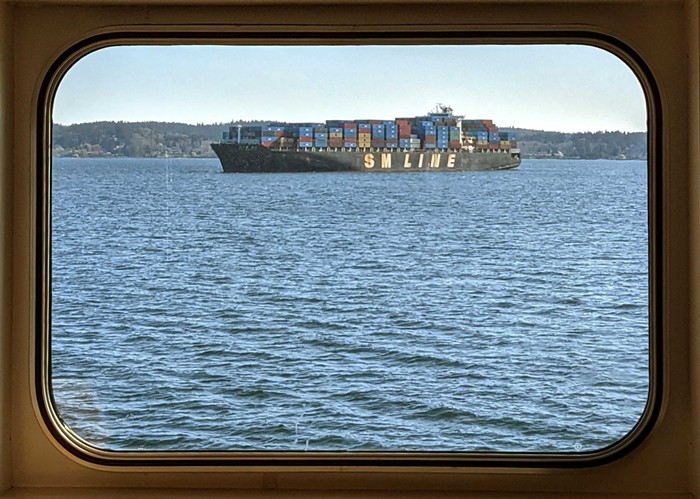
Boeing is basking in what is not very great or impressive news: its new and huge plane, the 777-9X, flew successfully for four hours on Saturday, January 25, after taking off from Paine Field in Everett. But there was such timidity in this maiden flight. A little wind spooked the pilots. They did not want to take off except under the most acceptable conditions ("the manufacturer wants optimum conditions"). A failure could not happen no matter what. There are over 300 hundred orders for this plane, which costs a little more than $400 million. Sure, it's not as popping in sales as the 737 Max, but the company was very desperate for good news of any kind, as it has received absolutely none since that crash in the Horn of Africa.
But what's not being stated at this moment is this: What is management still doing in Chicago?
Clearly the 2001 headquarter move from Seattle did not work out. It has indeed brought the company down to its knees. Because of mismanagement, Boeing now has $100 billion worth of planes whose future is completely unknown and, at present, no airline wants anything to do with. One airline, Ryanair, is even rebranding planes in the 737 series for the purpose of staying as far away from the 737 Max as it can. Other airlines are bound to do the same. And yet, the heads isolated in the "hog butcher for the world" are completely convinced that all will end well soon enough.
I'm not a fan of the opinions of Seattle Times' editorial board. No siree. It's instinctively pro-business and can be expected, at all times, to side with CEOs in all matters concerning our city. So, when it did not bring out the pom-poms and do backflips for Boeing's new CEO, Dave Calhoun, who promises to regain the company's lost prestige and consumer confidence, it was more than clear that it saw Boeing's management had not yet grasped the true and even dangerous scale of the crisis.
From Seattle Times' unimpressed, very sober, non-pom-poms-shaking editorial board:
In the first public test of Boeing CEO Dave Calhoun’s tenure, he failed to demonstrate that he’s the transformative leader the embattled aerospace titan needs. Instead, in an interview with reporters Wednesday, he was combative and defensive of the company’s actions.What is it that Boeing's management is not quite getting or resisting to address? The "erosion of its quality standard," which Seattle Times blames on "a corporate culture that," to put it as politely as possible, "seemed to have emphasized profits over safety." What is the solution to this terrible state of things? Seriously, I did not say this but the conservative editorial board did: institute a "deep overhaul." How deep? It sounds like the board wants it to be "deeper than abyss" (if I may borrow the words of Method Man). The abyss is this 737 Max crisis.The company is in a prolonged crisis, brought on by erosion of its quality standards. A corporate culture that seemed to have emphasized profits over safety threatens Boeing’s long-term viability as an industry standard-bearer. Two rushed-to-market 737 MAX planes crashed, one in October 2018 and another in March, killing 346 people. Investigations found flight-control system problems caused both crashes. The worldwide fleet remains grounded, and production is still shut down.
Boeing has so many grounded 737 Max planes that it has to park them in employee parking lots of its Seattle headquarters while it works on fixes https://t.co/PPKZzTdrLa pic.twitter.com/pEjzkNLNRf
— Massimo (@Rainmaker1973) June 28, 2019
At this point, how can calling for the closure of the corporate headquarters in Chicago and reuniting management with workers here in Seattle, here where the enterprise began, be considered unreasonable or wishful thinking? If you want a "deep overhaul," you cannot get much deeper than that. In fact, I strongly recommend the reader compare the board's opinion piece with the USA Today article by a US man who lost his daughter in the Ethiopian crash—"I've learned more about aviation than I ever dreamed, and how Boeing let safety slip." What you will see are structural similarities and conclusions about Boeing's management and new CEO.
The father writes:
Now I know more than I ever dreamed about aviation safety, and I know that a bad board of directors can cost lives... My family and I have learned more than we ever wanted to know about the design, certification, regulation and production of commercial airplanes. Boeing’s change of management is not new, but its officials must chart a new course and tell shareholders to accept a cut. The company must focus on rigorously instituting best performance practices befitting a national champion aviation and defense company.
For me, deep overhaul or a truly new course would also require the nationalization of the corporation. It is clear that Boeing's management has no realistic long-term way out of the 737 mess. A bad CEO has simply been replaced by another bad CEO. This is what happened last month and nothing more. What we have seen so far at the top is a huge (otherworldly) compensation to the former CEO, Dennis A. Muilenburg, who helped lead the company right into this multibillion-dollar mess by focusing on stock market buybacks that transferred the company's much-needed cash (much-needed by workers) to those who, like him, owned large chunks of Boeing's shares. (Muilenburg's compensation for fucking up the company was an obscene $62 million.)
But as the Boeing crisis continues, and management continues making every effort to keep things as they were before the crash in Ethiopia, its directly and indirectly laid-off workers in Kansas, Oklahoma, and Missouri are being pushed into government job insurance programs (welfare). And at present, there are "600 major Max suppliers and hundreds of smaller companies" whose future is uncertain, and are also likely to lay off more workers. The public, in short, is already paying for the bad decisions made by Boeing's management. These workers are being punished, the public is being punished, and the CEO was rewarded with more money than "a sucker could ever spend" (to use the words of Sugarhill Gang).
By the way things look so far, we can expect that management has no other object in mind than directing more rewards to itself. The Seattle Times's editorial board might be stupid, but they're not that stupid. Even they know that Boeing's management is not doing nearly enough to win the public's trust and, most distressing of all, has no serious long-term plans.
Seattle Times' board:
Calhoun’s leap into being the day-to-day leader after a decade on Boeing’s board suggests company leadership thinks tweaks to the status quo will right the business.What is this new CEO smoking? Does he really know what's going on? Every one of those planes is on the ground and losing millions by the minutes. How long can this kind of daydreaming last? And is management really considering rebranding as an option? Is it really going to take the advice of a bankrupt businessman who couldn't even sell steaks?“I believe this culture is a good one,” Calhoun said in the interview. “Our employees care about safety first. They do that. They walk that talk, but their confidence is, right now, shaken. My job is to re-instill it.”
He denied that he had seen safety de-prioritized for business reasons and spoke repeatedly about the company’s problems in terms of lost confidence, not a deep cultural failing.
Close Chicago. And bring Boeing back to reality.
Boeing headquarters is disappearing right in front of my eyes. Fog City in Chicago. @Livestormchaser @GarofaloWX @WeatherNation @NWSChicago pic.twitter.com/0V2ZtK8GiQ
— Stringr2734 (@stringr2734) January 15, 2020



















